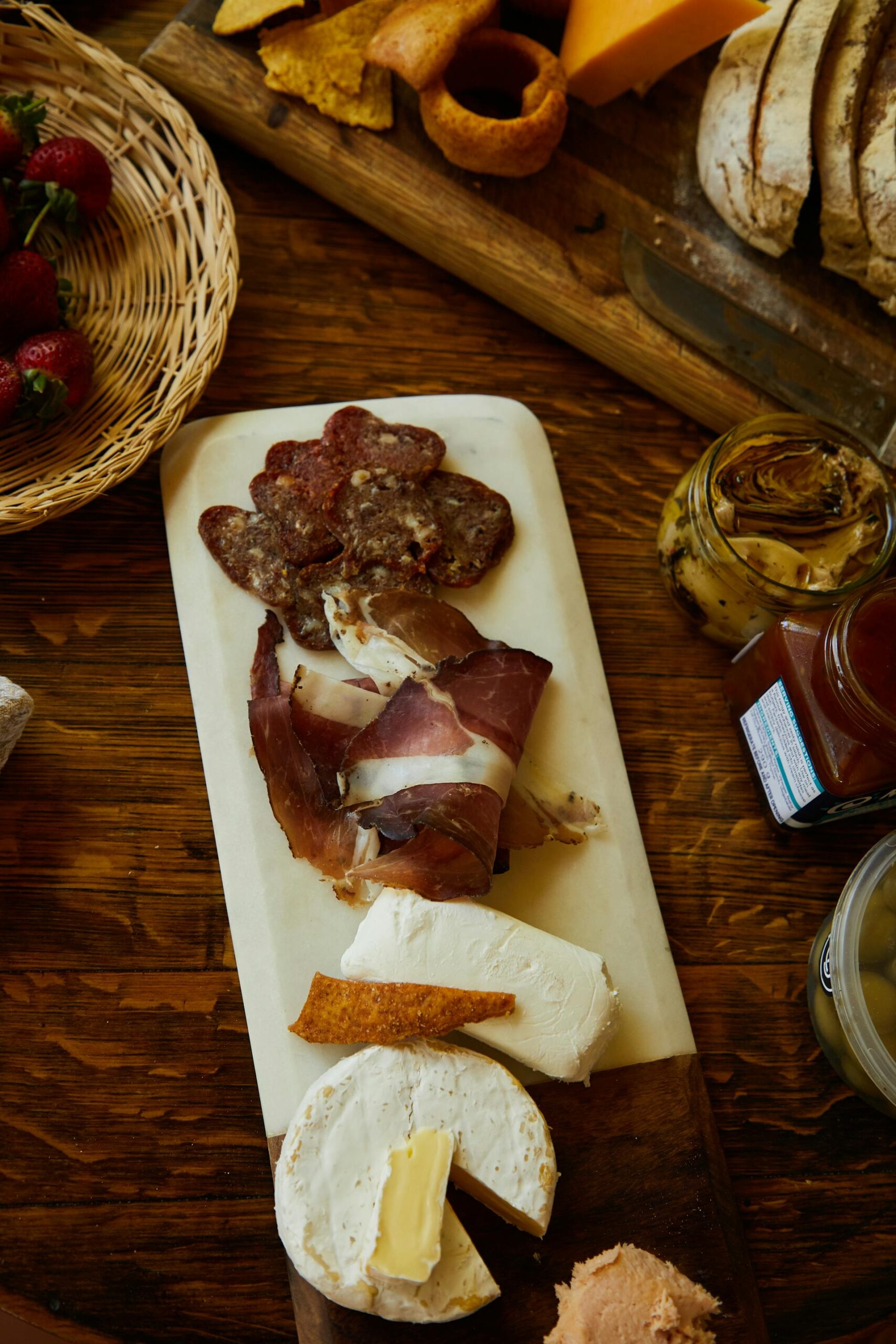
Introduction
As consumers become more conscious about where their food comes from, the demand for organic and ethically sourced meats has surged. Organic charcuterie, made from sustainably raised animals, offers a delicious and responsible choice for meat lovers. This blog will guide you through the key factors to consider when sourcing ethical charcuterie meats.
Why Choose Organic Charcuterie?
Organic charcuterie is made from animals raised without synthetic hormones, antibiotics, or harmful pesticides. Choosing organic means supporting farming practices that prioritize animal welfare and environmental sustainability.
- Animal Welfare: Animals raised for organic charcuterie are often given access to outdoor pastures, allowing them to engage in natural behaviors like grazing and foraging. These animals are not confined to small cages or overcrowded feedlots, contributing to better overall health and a higher quality of life.
- No Synthetic Chemicals: Organic meats are produced without the use of artificial fertilizers, chemical pesticides, or GMOs in the animals’ feed. This ensures that the meats are free from harmful residues and are better for both your health and the environment.
What to Look for When Sourcing Organic Charcuterie
When sourcing organic charcuterie, there are several certifications and practices you should look for to ensure you’re buying ethical and sustainable products.
- Organic Certification
Look for certifications like USDA Organic or EU Organic, which guarantee that the meat was raised according to organic farming standards. These certifications ensure that the animals were fed organic diets, raised without synthetic chemicals, and treated humanely.
- USDA Organic: In the U.S., this label guarantees that the meat comes from animals raised with access to pasture and organic feed, without the use of synthetic hormones or antibiotics.
- EU Organic: In Europe, the EU Organic label follows similar guidelines, ensuring animal welfare and sustainable farming practices.
- Pasture-Raised or Free-Range Labels
These labels indicate that the animals were raised outdoors with access to pasture, providing a more humane and environmentally sustainable alternative to factory farming. Pasture-raised animals forage naturally, contributing to better health and flavor in the meat.
- Why It Matters: Animals raised in open pastures tend to have higher-quality, nutrient-rich meat due to their varied diets and active lifestyles. This method also helps maintain soil health and biodiversity on farms.
- Grass-Fed
While grass-fed isn’t the same as organic, it often goes hand-in-hand with ethical meat production. Grass-fed animals consume a natural diet of grasses and are typically raised in humane conditions. Grass-fed beef, for instance, is lower in saturated fat and higher in omega-3 fatty acids.
- Grass-Fed vs. Grain-Fed: Grass-fed animals generally live in more natural environments, unlike grain-fed animals that may be confined to feedlots and given diets not natural to their species.
- *Heritage Breeds
Some organic charcuterie is made from heritage breeds, which are traditional livestock breeds that have not been industrially modified for mass production. These breeds are often hardier and produce more flavorful meats than commercially bred animals.
- Why It’s Important: Heritage breeds are more closely aligned with the traditional, artisanal methods of charcuterie production, offering a richer flavor and preserving genetic diversity in livestock.
- Locally Sourced Meats
Buying from local, small-scale farmers is another way to ensure you’re supporting ethical practices. Small farms tend to have more control over their livestock and often prioritize sustainable, humane practices.
- Why It’s a Good Choice: Sourcing local organic charcuterie reduces the carbon footprint associated with transportation, supports regional economies, and gives you better insight into the farm’s practices.
Benefits of Organic Charcuterie
- Healthier Choice: Organic charcuterie is free from synthetic additives, hormones, and antibiotics, reducing exposure to potentially harmful chemicals. This makes organic meats a healthier option for consumers.
- Better Flavor: Animals raised in natural environments and fed organic diets typically produce more flavorful meats. Organic charcuterie often has a richer, more complex taste compared to conventionally produced options.
- Sustainability: Organic farming practices are more sustainable, helping to reduce soil erosion, preserve biodiversity, and reduce greenhouse gas emissions. Supporting organic charcuterie also helps fight against the environmental degradation caused by industrial farming.
Where to Buy Organic Charcuterie
To source high-quality organic charcuterie, look for trusted suppliers, farmers markets, or artisanal producers. Here are a few places to find organic charcuterie:
- Local Farmers Markets: Many local farmers produce organic charcuterie, giving you the chance to ask about their farming practices and animal welfare standards.
- Online Artisanal Shops: Specialty online shops often sell ethically sourced, organic meats. Look for producers that are transparent about their sourcing methods and certifications.
- Specialty Grocery Stores: Many health-conscious and organic-focused grocery stores carry a selection of organic and pasture-raised charcuterie. Be sure to check for certification labels to confirm the meat’s origins.
Conclusion
The rise of organic charcuterie reflects a growing desire for ethically sourced, sustainable, and high-quality meats. By choosing organic charcuterie, you’re supporting better animal welfare, healthier farming practices, and environmentally responsible food production. When sourcing ethical charcuterie, look for organic certifications, pasture-raised labels, and local suppliers to ensure you’re getting the best and most sustainable meats available.



